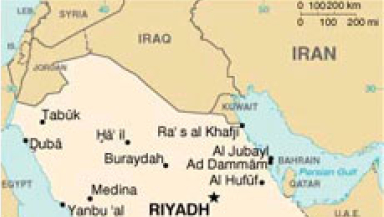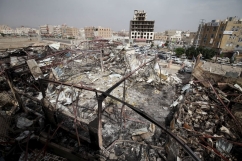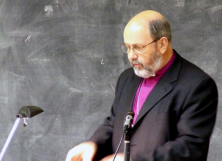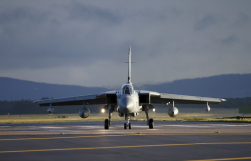There is a spectre haunting the Middle East and the rest of the world. A state fomenting violence in neighbouring lands. A state putting to death those who call for openness and democracy. A state which discriminates against women, gay people, Christians and various other minorities. There are reports that 50 people are imminently to be executed by this despotic regime.
The behaviour of this state is coming under increasing scrutiny in the West. Something must be done, declare an increasing number of commentators. But what course to take? We could apply sanctions, squeezing this state's ability to do business. We could form a coalition to demand change. We could threaten air strikes, or even troops on the ground.
Or we could sell vast quantities of arms to this state and give it a seat on the United Nations Human Rights Council.
Well, we surely haven't taken the last option have we? I'm afraid so.
Because the state in question here isn't the vile Islamic State which is now terrorising large swathes of Syria and Iraq. It isn't Iran, where hundreds of executions still take place every year. It isn't Egypt or Qatar or UAE or any of the other autocratic regimes which also systematically abuse human rights.
It's our old friend and ally Saudi Arabia.
Saudi Arabia, which avoided any military reprisals, despite 15 of the 19 hijackers on 9/11 being Saudi. A country where leading figures say it is, "necessary to destroy all the churches of the region." Saudi Arabia, which is currently bombing and starving the people of Yemen precipitating a vast humanitarian disaster. Saudi Arabia which, according to one country expert, is protecting, "sexually warped, slave-owning princes." Saudi Arabia, which sentences poets to death, which, according to MSF, bombs clinics, which hands out lashes to those who dare to express themselves.
The horror. The horror. The Heart of Darkness.
Since Saudi Arabia was formed with British and American acquiescence in the aftermath of the First World War, it has been deemed to be in our 'interests' to maintain a cordial relationship with the Saudis. All the while it has been an incubator for the strictly puritanical Salafi form of Sunni Islam that is the driving ideology of extremism. Wahhabism has flourished in Saudi Arabia, a kind of Restorationist movement which not only imposes overbearingly conservative Islamic codes on people who live in the Kingdom, but also inspires the grotesque violence that now drives the Islamic State forward.
In that time, we have essentially turned a blind eye to the many and various outrages that take place within Saudi Arabia. It would be naive to suggest that this is just because of the amount of oil the Saudis provide (around 25 per cent of the world's supplies) but it would be equally naive to suggest oil doesn't play a role. The Saudis have flexed their muscles before – cutting oil supply to the West in the wake of the 1973 Yom Kippur war, which contributed to the three-day week being imposed in the UK. Our oil-thirsty Western societies need the supply to keep flowing so we are willing to overlook crimes that would be unthinkable among other allies.
There is also the security factor. For while all manner of human rights abuses take place within Saudi borders, it has been a reliable partner for the US-led war on terror. In fact, going back through recent history the Saudis have provided a base for American operations in the first Gulf War as well as being a counterbalance to the region's other dominant power – Shia-dominated Iran.
For too long, our reliance on oil and our acceptance of the relative stability of the Saudis' iron fist has helped to guarantee not only acceptance but celebration of this gruesome dictatorship. As over 150 have been executed in the Kingdom this year, we have heard barely a peep from our own governments. Indeed, when pressed on the crucifixion charge handed to a 17-year-old Saudi dissident, David Cameron squirmed, but made it clear that he hadn't intervened personally to attempt to stop it. But Cameron is merely carrying on the obsequious kowtowing of his predecessors. In 2006 Tony Blair's government cancelled Serious Fraud Office investigation into allegations of bribery relating to a huge arms deal, done when Margaret Thatcher was Prime Minister. From Prince Charles to John Kerry, British and American officials have been pictured deep in conversation with senior Saudis, but the human rights abuses never seem to end.
But maybe, just maybe, the tide is beginning to turn.

Sweden's Foreign Minister was one of the most senior politicians to put her head above the parapet. Margot Wallström criticised Saudi Arabia for its treatment of women and its punishment of the blogger Raif Badawi. Labour Leader Jeremy Corbyn has done similarly. The Archbishop of Canterbury, Justin Welby, has also spoken out. In the House of Lords during the debate on bombing ISIS, Welby – who has serious credibility from his time in reconciliation as well as the oil trade – said, "There must be a global theological and ideological component, not just one in this country, to what we are doing... And it must include challenging Saudi Arabia and Qatar, whose own promotion of a particular brand of Islamic theology has provided a source from which ISIL have drawn a false legitimisation."
The Spectator has reported on how significant Welby's remarks are – in the case of a long-held silence from leading figures – describing it as a "bold statement from a member of the British establishment."
Change may also be coming to the Kingdom itself. Breathless reports of internal schisms and impending implosion of Saudi Arabia have been reported in the blogosphere for the past few months. But this may come to nothing.
What is certain is that the starting gun has been sounded. It's time for us in the West to call out the abhorrent abuses of power committed by our allies, the Saudis. Sure, there'll be threats and backlash, such as the Saudis' attempt to sue critical Twitter users. But what is done in the dark will be brought into the light. It's time for the West to be on the right side of history.
















